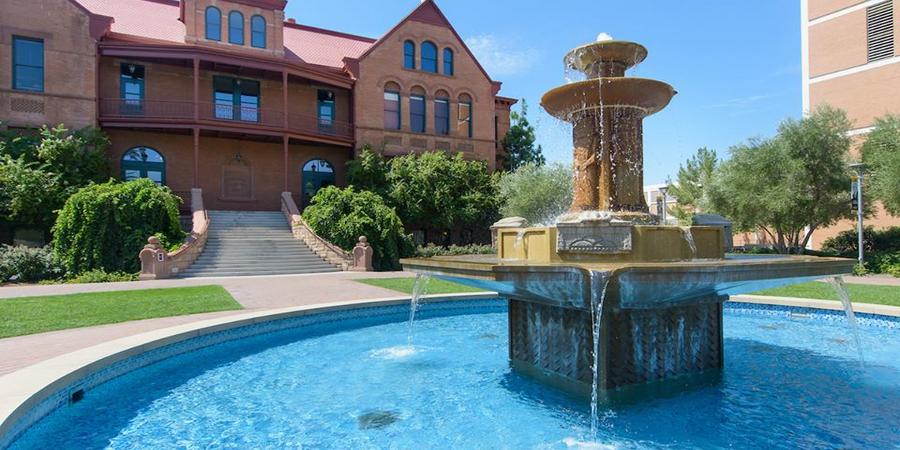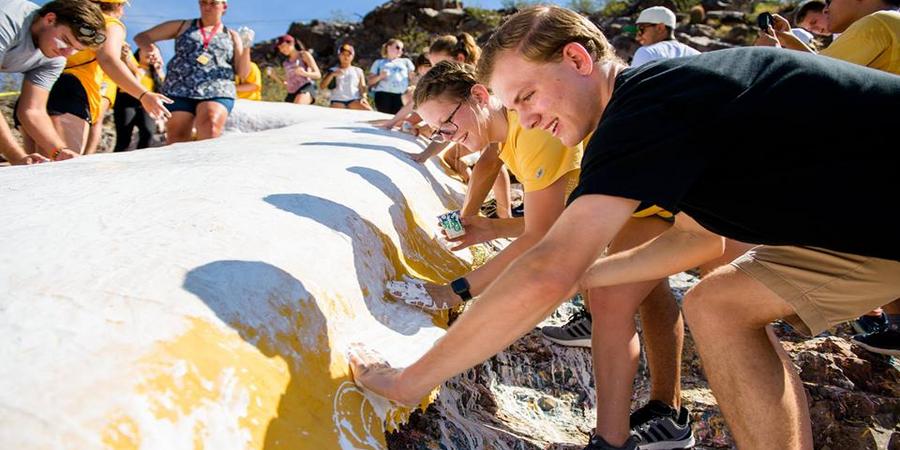Arizona State University (ASU)
- University
- College
- Co-educational private schools
- english
About the Arizona State University (ASU)
Arizona State University (ASU) was founded in 1885 as the Territorial Normal School in Tucson, Arizona. Initially, the institution prepared teachers, but over time it significantly expanded its programs and research opportunities. Key events in ASU's history include: 1958: Renamed to Arizona State College, reflecting the expansion of academic programs. 1961: ASU achieves university status. 1994: ASU becomes one of the first universities to receive the designation of a "National Center for Research" from the National Science Foundation. 2009: ASU adopts the concept of a "university for all," focusing on accessibility and inclusivity in education. ASU's achievements include: Leading research initiatives: ASU consistently ranks highly in national and international rankings for its research achievements and innovative programs. Recognition in sustainability: ASU has been named one of the most sustainable universities in the US by the Princeton Review. Educational philosophy and teaching approaches: ASU's educational philosophy is centered around creating an inclusive and accessible educational environment. The University adheres to the following approaches: Scholarly-research approach: Students are actively involved in research projects from early courses, contributing to the development of critical thinking skills and practical application of knowledge. Interdisciplinary studies: ASU encourages the study of multiple disciplines, allowing students to develop a broader understanding of the world and create innovative solutions to complex problems. Flexibility in learning: Considering the diverse needs of students, ASU offers multiple formats of learning, including online courses, evening classes, and part-time programs. Role and significance of the educational institution: ASU plays a key role in the educational system of the region and the world. With over 70,000 students, it is the largest public university in the US. Key aspects of ASU's significance include: Education for all: ASU actively works to ensure access to quality education for students from all walks of society, including programs for low-income and first-generation students. Supporting the regional economy: The university collaborates with local and international companies, creating jobs and contributing to economic growth. Global cooperation: ASU actively participates in international partnerships and exchange programs, promoting the exchange of knowledge and cultures.
MoreLoading...
Admission conditions in Arizona State University (ASU)
Taking the exam: SAT or ACT: Submitting the results of the SAT or ACT tests is not mandatory for all students, however, many programs may recommend or require these tests. Age: Students must be over 18 years old or have legal permission from parents/guardians if they are younger. Application submission: The application can be submitted through the ASU online portal. Application fee: The application fee is $85 for foreign students. High school diploma: A translation of the high school diploma into English is required. The translation must be done by an accredited translator. Recommendations: Two recommendations from teachers or other academic advisors who are familiar with your academic achievements and potential are required. School transcript: A report of academic performance for the past years is required (may include interim and annual reports). Financial proof: Foreign students must provide evidence of having sufficient funds in a bank account to cover the expenses of education and living in the USA. Language test requirements: If English is not your native language, you must provide results of TOEFL (minimum 61) or IELTS (minimum 6.0) tests. Visa application: After receiving the acceptance letter, you will need to apply for an F-1 or J-1 visa to study in the USA. Additional documents: Additional documents such as a motivational letter or portfolio may be requested (depending on the program).
MoreMinimum rating for admission to Arizona State University (ASU)
Minimum admission requirements for ASU SAT: Minimum score of 1130 (out of 1600) for most programs. However, some competitive programs may require a higher score. ACT: Minimum composite score of 22 (out of 36) for most programs. Like SAT, some specialized programs may have higher requirements. Grade Point Average (GPA): Minimum GPA for undergraduate admission is 3.0 (on a 4.0 scale) for US students. Foreign students are required to have an equivalent level. Competitive Programs Some programs, especially in fields such as engineering, business, and healthcare, may have stricter requirements: Engineering programs: Minimum SAT scores may reach 1300, and ACT scores—27. Business programs: Similarly, for business schools, a SAT score of around 1200 and ACT score of 25 may be required.
MoreProspects after completing studies in Arizona State University (ASU)
After completing their studies at Arizona State University (ASU), graduates have a wide range of career prospects and further research opportunities. ASU is one of the largest universities in the United States with an excellent reputation, which increases the chances of employment. ASU graduates work in leading companies and organizations such as Intel, Boeing, and NASA. The university actively develops career growth programs and provides access to internships, allowing students to gain practical experience during their studies. ASU also has high employment rates, and graduates' careers cover various fields: from business and technology to healthcare and the arts. The university supports graduates through extensive networks, career fairs, and counseling, helping them find jobs or continue their education in master's and doctoral programs. Thus, ASU provides graduates with a strong platform for a successful career.
MoreTitle | Age | Period |
|---|---|---|
| Bachelor's Degree program in English | 18+ | 1 year |
| Master's Degree program in English | 21+ | 1 year |
| University Pathway (english) | 17+ | 1 year |
| Pre-Masters (english) | 20+ | 1 year |
Leave a review
Loading...















Reviews
I am studying at ASU for the second year. The very first thing that surprised the university was the size of the campus. I knew that American universities are not small, but Arizona State has a really huge campus. At first, it was difficult to get used to it and navigate. The university is very well equipped, especially the sports hall and library. There is a convenient application for university students, where you can turn on all sorts of reminders and see changes in the schedule. The design faculty I'm studying at now is beautiful in every sense. Absolutely all teachers are adequate and know how to convey the material. I have never regretted that I chose this university.
Read in fullI entered here for the first year of master's degree after the New York Pace. To be honest, I never thought that after New York I would move to Arizona, but because of the dollar exchange rate, it was already difficult to pull 2 years of master's degree at NY with its housing prices, and ASU was one of the few options with strong linguistics and for adequate money. I liked how quickly the whole process of enrollment in the course went. The application was considered within 2 weeks, my questions were usually answered within 1-2 days. I especially want to note the accommodation. Everything is new, clean. In big cities, there are usually problems with this, but here everything is at a good level. I can recommend it to those who are ready to live in a small and quiet city.
Read in fullMy opinion is that this is one of the best American universities!! Which offer !completely! online programs. We suffered for a long time before finding a normal full-fledged version of the International Online Baccalaureate. My son is an athlete and physically cannot fully study full-time because of his performances. We were looking for an online bachelor's degree in management, we considered options in Europe, but in terms of cost and quality, they did not triple us. We turned to Smapps for help with the selection of options. I want to thank the company for such a detailed analysis of the curriculum that they made for us! We were given a detailed curriculum for the entire program, which, in fact, helped to make the final choice. I want to say right away that despite the fact that the program is completely online and the schedule is quite flexible, you have to work a lot. At first, it was very difficult for my son, as he had to perform a large amount of tasks on the platform, plus pull up the material that he missed due to the competition. Over time, he got involved, but you really have to learn.
Read in fullIs there a full financial aid? And how can I get that?
Read in full